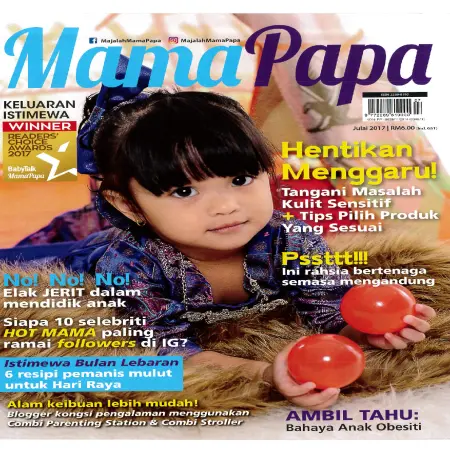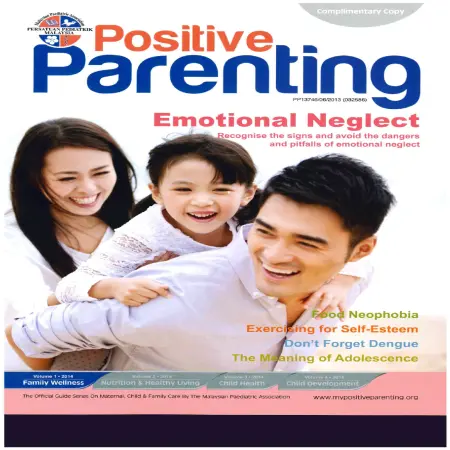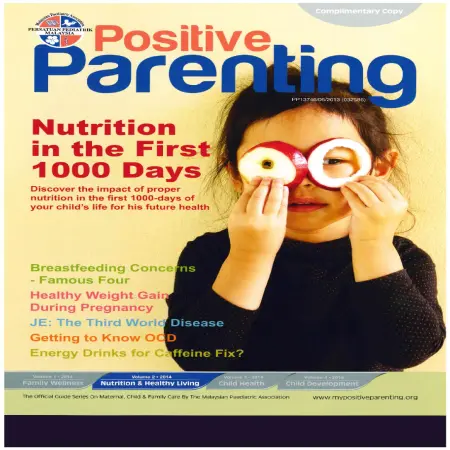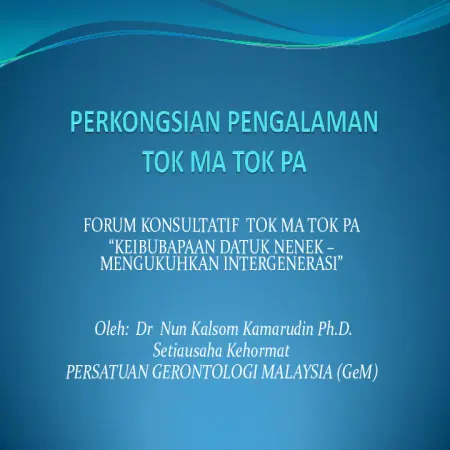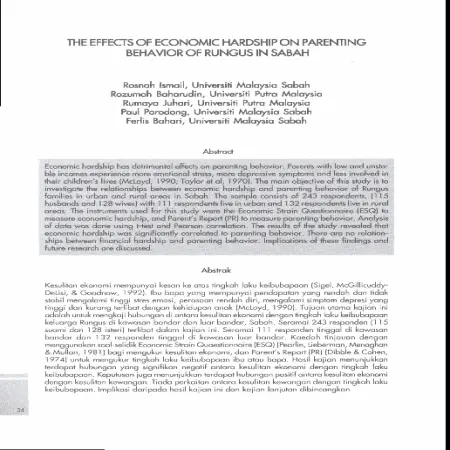TOPICS
Results for Topics : "Parenting"
|
|
Ajar anak hargai ibu bapa
Item Type: Article
Editor:
Year: 00/07/2017
Abstract: Parents are the most important people in everyone's life. Their service to us is priceless. Ever since we were in the womb, the mother has carried us in her womb for 9 months and 10 days and it is the mother who gave birth to us. Not to be forgotten is also the role of the father who is the leader and takes care of us to the best of our ability. We can show love to our parents by respecting and obeying them. Our parents have instilled pure values in us and educated us since childhood to the best of our ability.
|
|
|
|
|
|
Sharing responsibilities
Item Type: Article
Editor:
Year: 00/00/2014
Abstract: Traditionally, women have assumed the role of the caregiver, while husbands sought to provide financial support for their families. Society has come a long way since and women are now leaders and working professionals in their own right.
Increasingly, the domain of marriage is becoming a partnership between husband and wife. Household responsibilities and domestic affairs are no longer a one-way street, but are managed together and shared.
|
|
|
|
|
|
Outsourced parenting
Item Type: Article
Editor:
Year: 00/00/2014
Abstract: Housemaids have become an integral part of family life in Malaysia, some may say it’s a necessity – they provide much needed support to parents who often don’t have extended family around to assist with childcare or dual career parents who are often left with little choice and require help as well as support to carry out their family responsibilities.
It’s fair to say that commitment and devotion towards a successful career and rearing a child requires both sacrifice and no small amount of resolve and effort for either to work out in tandem. These and other factors prompt most parents to employ a housemaid, helper or caregiver to assist them in carrying out their roles and responsibilities. The notion being that maids would provide assistance to much needed help around the house and allow parents more freedom and time to spend with their children.
From things like potty training, to swimming and riding a bicycle, from learning not to bully other kids to learning from mistakes and forgiving other people for them. All these are lessons that can be outsourced to maids, helpers or even professionals. But just because it can, doesn’t mean that it should.
|
|
|
|
|
|
Perkongsian pengalaman tok ma tok pa
Item Type: Conference or Workshop Item
Editor:
Year: 00/00/2012
Abstract: This presentation shares experiences on how to empower family institutions as well as how these changes are impacting the current scenario such as increasing social or negative symptoms. A new culture that is not filtered to the family. The institution of the family is increasingly challenging, parents are unaware of the condition of the children. Parents, grandparents and the community are unprepared from the knowledge, mentality and awareness to cope with new scenarios. Actions that can be taken to cope with the transition of new scenarios are through continuous learning for parents, grandparents and the community, creating a mutually supportive growing environment, enabling grandparents to assist in parenting, more integrated, more knowledgeable and sustainable family governance and a more caring community.
|
|
|
|
|
|
Parenting@Work module
Item Type: Module
Editor:
Year: 00/00/2010
Abstract: The National Population and Family Development Board (NPFDB) has developed a Parenting@Work courses designed to help dual career families cope with the multiple demands of work and family life. Through the Parenting@Work courses, you will have the opportunity to learn the skills and techniques of balancing family and work, time management as well as gain valuable parenting knowledge and skills to make you a better parent. You are urged to utilize the opportunity provided by NPFDB to enhance your knowledge and skills in facing contemporary family challenges.
|
|
|
|
|
|
The effects of economic hardship on parenting behavior of Rungus in Sabah
Item Type: Article
Editor:
Year: 00/01/2004
Abstract: Economic hardship has detrimental effect on parenting behavior. Parents with low and unstable incomes experience more emotional stress, more depressive symptoms and less involved in the children's lives (McLoyd,1990;Taylor et al, 1970). The main objective of this study is to investigate the relationship between economic hardship and parenting behavior of Rungus families in urban and rural areas in Sabah. The sample consists of 243 respondents, (115 husbands and 128 wives) with 111 respondents live in urban and 132 respondents live in rural areas. The instrument used for this study were the Economic Strain Questionnaire (ESQ) to measure economic hardship, and Parent,s report (PR) to measure parenting behavior. Analysis of data was done using t-test and Pearson correlation. The result of the study revealed that economic hardship was significantly correlated to parenting behavior. There are no relationship between financial hardship and parenting behavior. Implications of these findings and future research are discussed.
|
|
|
|
|
|
I'm In Control module (Parent's Edition)
Item Type: Module
Editor:
Year: 00/00/2000
Abstract: The I'm In Control module (Parent's Edition) has been developed to complement the I'm In Control Module developed for teenagers. The module objectives are to enhance parent's knowledge on the physiological, biological, physical and social development of adolescents, to increase parenting knowledge and skills on adolescent sexual and reproductive health and to provide skills on enhancing parent-teen relationship.
|
|
|
|





